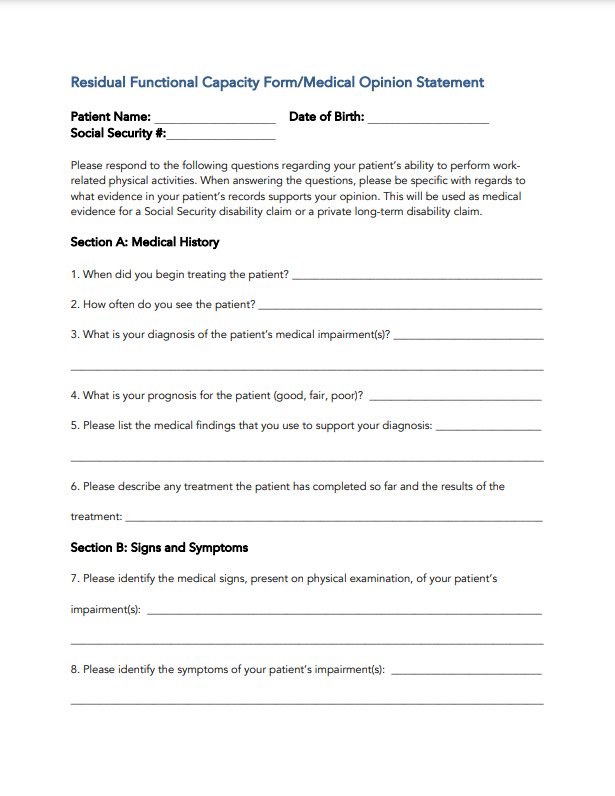Understanding SSDI Residual Functional Capacity (RFC) for Physical and Mental Impairments
Navigating the Social Security Disability Insurance (SSDI) process can be daunting, especially when it comes to understanding the evaluation of your ability to work with physical or mental impairments. One crucial component of this assessment is the Residual Functional Capacity (RFC) evaluation. Whether you're dealing with physical limitations, mental health challenges, or a combination of both, comprehending RFC is essential for your SSDI claim. In this article, we'll delve into what RFC entails, how it's assessed, and its significance in the SSDI application process.
What is Residual Functional Capacity (RFC)?
Residual Functional Capacity (RFC) refers to an individual's ability to perform work-related activities despite the limitations caused by their medical condition(s). RFC assessments are conducted by disability examiners or administrative law judges (ALJs) to determine the extent to which a person's impairments affect their capacity to work.Physical RFC:
For individuals with physical impairments, the RFC evaluation focuses on their ability to perform various tasks related to physical exertion, mobility, and stamina. This assessment may consider factors such as lifting, carrying, standing, walking, sitting, and reaching. It takes into account the frequency and duration of these activities that an individual can sustain, as well as any environmental limitations, such as exposure to extreme temperatures or hazards.Mental RFC:
Similarly, for those with mental health conditions, the RFC assessment evaluates their ability to handle work-related tasks that involve cognitive, emotional, and social functioning. This may include concentration, memory, understanding and following instructions, interacting with others, adapting to changes in the workplace, and managing stress. Mental RFC assessments aim to gauge how a person's mental impairments impact their ability to function effectively in a work setting.How is RFC Assessed?
RFC assessments are based on medical evidence, including reports from treating physicians, specialists, therapists, and other healthcare providers. These reports detail the individual's medical history, clinical findings, symptoms, treatment regimens, and prognosis. Additionally, observations from physical or mental examinations, diagnostic tests, and functional assessments may be considered.In some cases, vocational experts or consultants may be involved in the RFC evaluation process. They provide insights into the specific demands of various occupations and how an individual's impairments may affect their ability to perform those tasks.
Significance in the SSDI Application Process:
RFC assessments play a pivotal role in determining eligibility for SSDI benefits. The Social Security Administration (SSA) uses RFC evaluations to assess whether an individual can perform their past relevant work or adjust to other types of work considering their limitations. If the RFC assessment concludes that a person's impairments prevent them from engaging in substantial gainful activity (SGA), they may be deemed eligible for SSDI benefits.It's essential for SSDI applicants to provide comprehensive medical documentation to support their RFC assessment. This includes detailed medical records, treatment notes, functional assessments, and any other relevant documentation that substantiates the severity and impact of their impairments on their ability to work.
Understanding Residual Functional Capacity (RFC) is crucial for individuals seeking SSDI benefits due to physical or mental impairments. Whether you're dealing with chronic pain, mobility limitations, psychiatric disorders, or cognitive impairments, the RFC assessment evaluates your capacity to work despite these challenges. By providing thorough medical documentation and cooperating with the RFC evaluation process, SSDI applicants can improve their chances of receiving the benefits they deserve.
RFC FORMS: DOWNLOAD RFC FORMS
SSA FORMS:
Disclosure: As an Amazon Associate, www.disabilitytips.org earns from qualifying purchases. We only recommend products we trust and love!

%20for%20Physical%20&%20Mental.jpg)




0 Comments